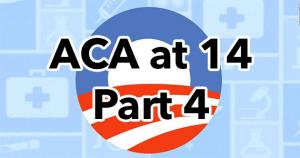Happy Birthday #ACA! (Part 4: Premiums & Financial Assistance)

Part 1 | Part 2 | Part 3 | Part 4 | Part 5 | Part 6 | Part 7
Next up: Premiums, Advance Premium Tax Credits (APTC) and Cost Sharing Reduction (CSR) assistance.
Nationally, the average unsubsidized premiums for 2023 exchange-based Open Enrollment Period enrollees is $605/month, exactly the same as 2023.
This is a noteworthy because officially 2024 ACA exchange premiums were "supposed" to increase by 6.0% on average. This discrepancy is mostly because the 6% assumes that 100% of those enrolled in each plan in 2023 renews that exact same policy (without any attrition or additional enrollment), which of course is never the case...even if total QHP selections were identical year over year, not all of the enrollees would be the same people, millions of them would switch to different policies and so on.
New Hampshire has the lowest average ACA premiums this year at $453/month, while West Virginia once again has by far the highest at a whopping $1,119/month (although this is actually down $55/mo from last year).
Once again, nearly hafl (49.6%, up slightly from 48% last year) of all exchange enrollees receive Cost Sharing Reduction (CSR) assistance, ranging from just 2.6% in DC (where people earning up to 210% FPL are eligible for Medicaid instead) to over 71% of Mississippi enrollees, which is about the same as last year...except for some reason Massachusetts is showing up with a stunning 80% CSR rate, which makes no sense to me (they were at 58% last year).
Either there's a clerical error or the state made some sort of radical change to how they define income and/or CSR eligibility this year that I'm not aware of. They did expand their ConnectorCare program up from 300% FPL to 500% FPL this year, but the additional CSR assistance for that comes from state funding, not federal...I can't believe CMS would count that as federal CSR enrollment...
As for APTC assistance, over 92% of all exchange enrollees are eligible for premium subsidies this year nationally (up from 90% last year), ranging from 21% in DC (again, Medicaid to 210% FPL) up to just about every enrollee in Mississippi (98.1%).
If you disregard DC, MN & NY (both of which have BHP programs for enrollees earning up to 200% FPL), the lowest-APTC state is Washington at 71.2% of all enrollees.




